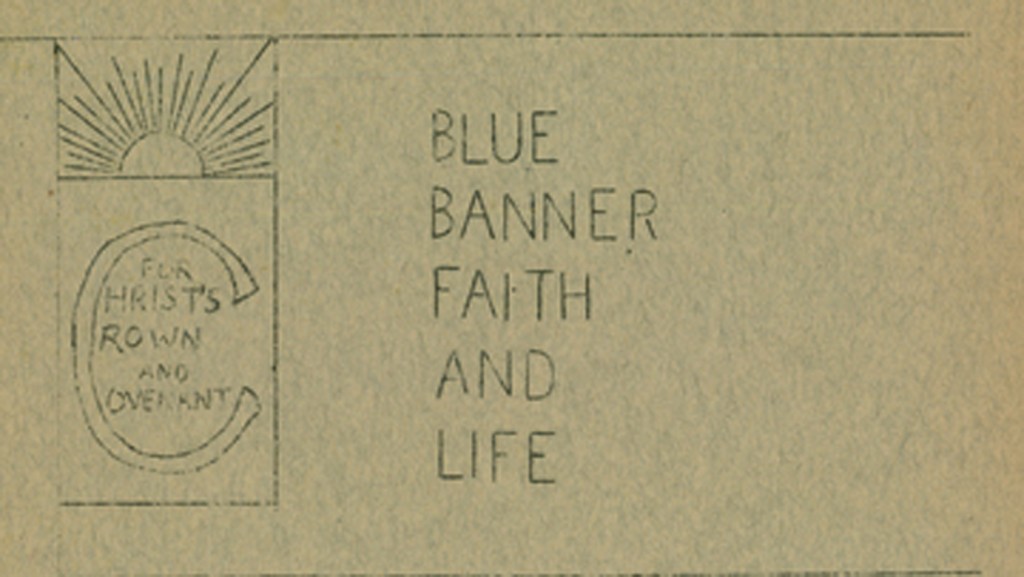You have free articles remaining this month.
Subscribe to the RP Witness for full access to new articles and the complete archives.
The church continually needs men and women committed to a gentle reformation, and I am encouraged to pursue the same by considering examples of saints in past generations.
Today, we consider Dr. J. G. Vos (1903–1983) who gently yet vigorously pursued reformation in his era. He was the son of Princeton theologian Geerhardus Vos, and served as a Reformed Presbyterian missionary in Manchuria, China, in the 1930s. When he returned to the States in the late 1930s, he was saddened and frustrated by the spiritual state of the denomination.
In the years following his service in China, Vos fought a number of battles in the RP Synod, but he did not make significant progress and was sometimes treated with great disrespect. He, with the help of Philip Martin, narrowly thwarted a move to welcome women to the office of elder in the RPCNA. The denominational magazine, the Covenanter Witness, displayed liberal and modernistic leanings, to the chagrin of men like Sam Boyle (also a missionary to China) and Dr. Vos. One editorial, “When Silence is Golden,” published March 15, 1944, promoted cooperation with liberal churches. Sam Boyle and J.G. Vos wrote letters to the editor, and Dr. Vos preached, published, and distributed a sermon in response to the editorial. The Covenanter Witness then published a series of articles in late 1944 titled, “The Theology of Social Regeneration,” written by a professor at Sterling College who was not a member of the RPCNA. These articles taught Arminian theology and the social gospel, among other false doctrines. Dr. Vos wrote a letter to the editor, which was apparently never published; so he wrote another letter, to which he attached the original letter to the editor, and sent it to all the ministers of the church in 1945. In the letter to the ministers he wrote:
“The Covenanter Church is faced with this issue today. We stand at a parting of the ways. Do we believe in a social application of the old-fashioned gospel and of the ethics of the Scriptures? Or do we favor a revision of the whole system of Christianity in terms of sociology? In other words, do we consider the social implications of Christianity as fruits, or are they the tree itself? Are the social benefits of Christianity to be regarded as valuable but subsidiary products of Christianity, or are they the main thing?”
Today, many become frustrated with their own church’s shortcomings and storm off to another denomination or create their own micro-Presbyterian body. Dr. Vos probably had more reasons than most to leave a denomination with serious problems, and yet he took a different approach. We would do well to learn from his example. His responses were certainly not always right, but instead of throwing a tantrum, he sat down at his typewriter in 1946 and began to write the quarterly publication called Blue Banner Faith and Life, “a very vocal but simple publication to set forth the true faith of the church.” Dr. Vos never knew how to type and simply used the “hunt and peck” method, but he got the message out nonetheless.
J.G. Vos had a knack for making biblical doctrine simple and understandable for daily application by the people he loved, and he became known as “The People’s Theologian.” Blue Banner Faith and Life was the original RP blog, so to speak, and contained systematic biblical and confessional teaching designed for adult Sabbath school classes, definitions of religious terms, history lessons, poems, assessments of developments in the wider church, Q&A segments, and book reviews. The positive response from the church was overwhelming. The gospel was by no means dead in the RPCNA, and what people needed and craved was a steady diet of basic and practical biblical and Reformed teaching. Dr. Vos provided just that in each edition of Blue Banner Faith and Life, and he did it with a strikingly cheerful tone, contrary to many who set out to reform the church. Though he was not popular with everyone in the Synod, his publication was commended by the Synod in 1947, and it became the raindrops that gently watered a reformation that transformed the RPCNA over the next three decades. Many pastors from that generation credit Dr. Vos with equipping them to minister in ways they had never known before.
God’s grace abounded through his teachings, and it should be noted that he did not merely write about biblical Christianity; he lived it. He invested his life into the lives of the members of the congregation he served in Kansas and later in the lives of the many students he taught at Geneva College. As a result of his trust in the sovereign God and his commitment to slow, steady, and positive instruction, Dr. Vos was able to say this when he ceased publication of Blue Banner Faith and Life in 1979 due to his failing health:
“I want at this point to express my thanks to God for His faithfulness. He used me and my not-too-modern equipment and not-too-great ability in bearing witness to the Reformed faith, and I think there has been a rebirth of the true confession in the Covenanter Church as in many others.”
We live in an age that demands instant gratification, even in the church. Dr. Vos, by his method, reminds us that God is most often pleased to work through the slow and steady method of faithful, patient, and cheerful instruction in the truth. That requires teachers and writers committed to such a method. It also requires readers committed to regularly and systematically absorbing the nutrients necessary for personal and societal reformation. Today, bluebanner.org stands dedicated to the theological contributions of Dr. Vos and it contains a fuller tribute written by Dr. Byron Curtis.
—James Faris
